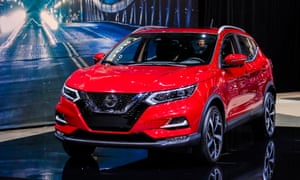Japanese says it will face additional expenses linked to payments to former chairman

Nissan lowered its 2018 forecast to an operating profit of £3.2bn.
Photograph: Tannen Maury/EPA
Japanese carmaker Nissan has cut its full-year profit forecast and taken a 9.2bn yen (£65m) charge related to the scandal around its former chairman, Carlos Ghosn, who was arrested over allegations of financial misconduct and breach of trust.
Nissan said it had booked the charge to cover additional expenses linked to payments to Ghosn, in its first results since his arrest in November for allegedly underreporting his pay by about 5bn yen between 2011 and 2015.
The Japanese carmaker lowered its 2018 forecast to an operating profit of 450bn yen (£3.2bn), down from 540bn yen, after weaker global car sales. It now expects revenues of 11.6tn yen, rather than 12tn yen.
Nissan said it revised its full-year forecasts “given the performance in the first nine months of the year”, when its share of the global car market slipped 0.1 percentage point to 5.9%.
The carmaker sold 4.02m vehicles over the period, down 2.1%, with growth in Japan, China and other markets offset by declines in North America and Europe. Nissan did better in the three months to December, its third quarter, when operating profits rose 25% to 103.3bn yen. It expects to sell 5.6m vehicles over the year.
Ghosn, regarded as one of the titans of the global car industry until his fall from grace, rescued Nissan from the brink of bankruptcy two decades ago and forged a three-way alliance with Renault and Mitsubishi Motors, which has come under pressure since the scandal erupted.
He was sacked by Nissan and resigned from Renault, where he was chairman and chief executive, three weeks ago, and is awaiting trial in Japan. He strongly denies any wrongdoing.
Although Renault and Nissan have vowed to keep their alliance, the scandal has heightened tensions between the French carmaker and its partners in Japan. Shortly before his arrest, Nissan executives were said to be unhappy about Ghosn’s plans to strengthen the firm’s ties with Renault.
Renault’s new chairman, Jean-Dominique Senard, will meet Nissan’s chief executive Hiroto Saikawa at the carmaker’s headquarters in Yokohama at the end of this week, their second meeting aimed at restoring trust between the two companies. They may also discuss Renault’s proposal for a merger, which Nissan has resisted.
The question of Senard’s position at Nissan may also come up for discussion. The French government, Renault’s top shareholder with a 15% stake, wants Senard or another Renault official to chair the Nissan board, a role once occupied by Ghosn. However, Nissan’s management wants to wait for an assessment by an internal governance committee created in December.